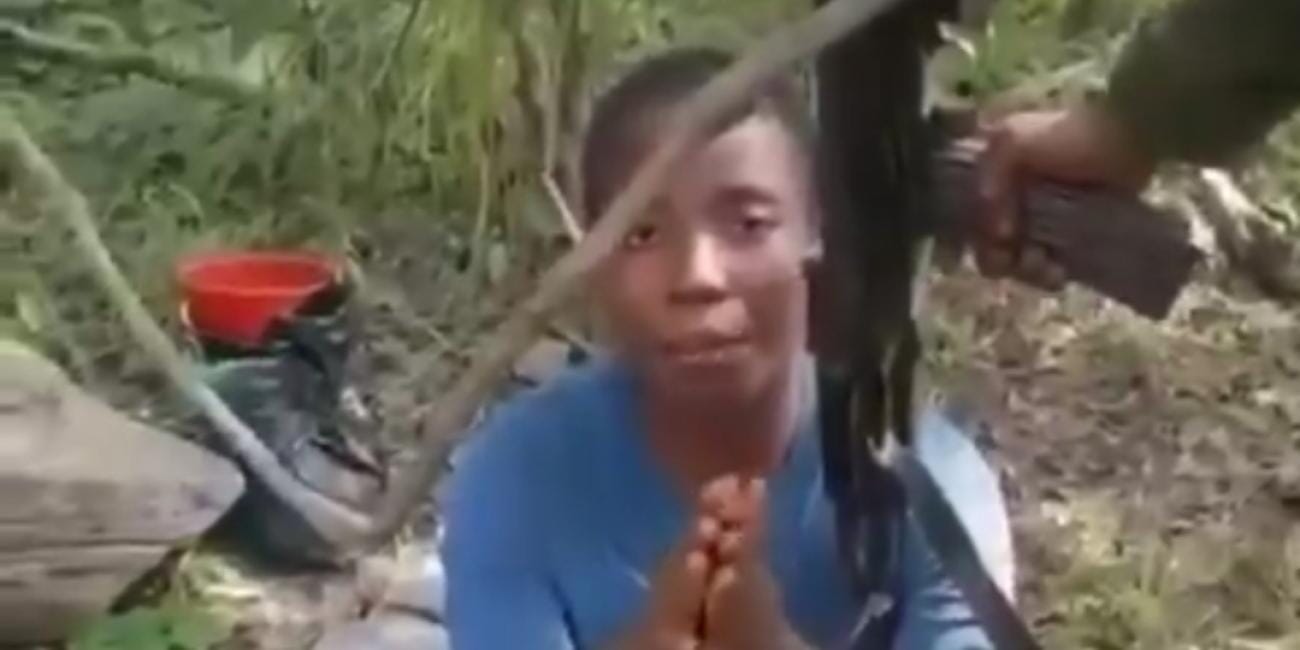In a distressing turn of events that has captured the attention of Nigerians and the world, Aisha Wahab, a young woman from Edo State, has been thrust into the spotlight through a viral video where she desperately begs for help to raise a ₦20 million ransom. Abducted over a week ago, her case highlights the escalating insecurity in the region. As the deadline has passed, concerns for her safety grow, prompting calls for immediate action from authorities.
Aisha Wahab Kidnapping Details in Edo State
The kidnapping of Aisha Wahab occurred on October 11, 2025, in Igbira Camp, Auchi, Edo State. Reports indicate she was taken by armed gunmen, a common tactic in the area's rising abduction cases. Auchi, known for its educational institutions and bustling community, has unfortunately become a hotspot for such crimes. Residents report that kidnappers often target vulnerable individuals, demanding hefty ransoms from families who are left in anguish. Aisha, described as a young lady with ties to the local community, was going about her daily routine when the incident happened. Her abduction has sparked widespread outrage, with social media buzzing about the need for better security measures.
Kidnappings in Edo State have surged in recent years, with criminals exploiting weak enforcement and porous borders. According to various reports, the state under Governor Monday Okpebholo has seen a spike in such incidents, turning it into what locals call the "heartbeat of kidnapping." In July 2025, two seminarians were abducted from the Immaculate Conception Minor Seminary in the same area, with one security officer killed. Despite a ransom payment, they remain unreleased, underscoring the persistent threat. Aisha's case fits this pattern, where victims are held in remote bush areas, forced to make pleas, and threatened with death if demands aren't met.
The kidnappers contacted her family shortly after, demanding ₦20 million, equivalent to about $12,000 at current exchange rates. This amount, while staggering for an average family, is typical in Nigerian kidnappings, where perpetrators view it as a lucrative business. The family's desperation has led to public appeals, but raising such funds quickly is challenging amid economic hardships.
Viral Ransom Video of Aisha Wahab: A Heart-Wrenching Plea
The viral video that brought Aisha's plight to light is nothing short of harrowing. In the clip, shared widely on platforms like X (formerly Twitter), Instagram, and Facebook, Aisha sits barefoot on the ground in a bushy, rocky terrain, wearing a blue t-shirt and black pants. Her hands are clasped in supplication as she speaks in Pidgin English, her voice trembling with fear.
"Help me, they wan kill me, abeg... Make una send money come abeg. My people, make una help me. Time de go. 5 o’clock dem con kill me," she pleads, her eyes wide with terror. A masked kidnapper stands over her, pointing a rifle directly at her head, emphasizing the imminent danger. The video, lasting about 27 seconds, shows her gesturing emphatically, urging viewers to act fast. In an earlier video from October 19, she displays bruised feet, fighting back tears while repeating her call for assistance.
This footage has gone viral, amassing thousands of views and shares. On X, posts from users like @fijnigeria and @YorncaGlobMedia have amplified the story, with one video noting the deadline had passed by the time of posting. The visual elements - the gun, her disheveled appearance, and the natural backdrop - paint a vivid picture of her captivity. Such videos are a tactic used by kidnappers to pressure families and the public, often leading to crowdfunding efforts. However, they also raise ethical questions about sharing traumatic content online.
Aisha's plea has evoked empathy across Nigeria, with many drawing parallels to other high-profile cases. The emotional impact is profound; viewers can't help but imagine the horror of being in her position. As the video circulates, it serves as a stark reminder of the human cost of insecurity.
₦20 Million Ransom Demand and Deadly Ultimatum for Aisha Wahab
The core of the kidnappers' demand is ₦20 million, with a strict deadline of 5 PM on October 21, 2025. They threatened to execute Aisha if the sum wasn't paid, a threat made explicit in the video where the gun is prominently featured. This ultimatum has heightened tension, as families in similar situations often negotiate or seek public donations.
Ransom payments in Nigeria fuel the cycle of crime, yet victims' loved ones have little choice. In Aisha's case, the amount reflects the perceived value kidnappers place on lives, often adjusted based on the victim's background. Reports suggest partial payments may have been made, but insufficient to secure release. The deadline's passage without confirmation of her fate has left many anxious, prompting speculation on social media.
Experts note that ultimatums are psychological tools to accelerate payments. In Edo, where kidnappings are rampant, such demands have become normalized, with criminals operating in syndicates. The ₦20 million figure, while high, is not uncommon; larger sums have been demanded in celebrity cases.
Family and Community Response to Aisha Wahab Kidnapping
Aisha's family has been vocal in their appeals, calling on the Edo State government and well-meaning Nigerians for help. They have shared contact details for donations, though specifics remain private to avoid exploitation. Community members in Auchi have rallied, organizing prayers and awareness campaigns. Social media has been instrumental, with hashtags like #FreeAishaWahab trending.
Human rights groups and media outlets, such as the Foundation for Investigative Journalism (FIJ), have highlighted the case, urging authorities to intervene. Residents express frustration over the government's inaction, accusing it of prioritizing other issues over citizen safety. One resident stated, "Edo State is fast becoming the heartbeat of kidnapping under the watch of Senator Monday Okpebholo."
The community's response underscores a broader call for solidarity. In Nigeria, where formal support is limited, public generosity often bridges the gap. However, this raises concerns about encouraging more abductions.
Government and Security Forces' Role in Edo State Kidnappings
Criticism has been leveled at the Edo State government and security agencies for failing to curb the menace. The police spokesperson, Moses Yamu, was contacted but did not respond, reflecting perceived indifference. Locals argue that while activists are swiftly tracked, kidnappers evade capture.
Under Governor Okpebholo, security has deteriorated, with residents demanding he "wake up to his responsibility." Federal efforts, like President Tinubu's claims of safer roads, are dismissed amid ongoing incidents. Enhanced patrols, intelligence gathering, and community policing are suggested solutions.
Broader Context of Kidnappings in Nigeria: Statistics and Trends
Kidnappings in Nigeria have reached epidemic levels, with thousands reported annually. In 2024 alone, over 1,000 cases were documented in the southern regions, including Edo. By 2025, the trend continues, driven by economic woes and armed groups. Edo's location makes it vulnerable, with ransoms funding further crimes.
Organizations like Amnesty International call for reforms, including better funding for security and anti-corruption measures. Aisha's case is one of many, but her video humanizes the statistics, urging collective action.
In conclusion, Aisha Wahab's kidnapping is a tragic emblem of Nigeria's security challenges. As we await updates, let's hope for her safe return and push for systemic changes to prevent future incidents. Stay tuned for developments.
Read More
- Uma Ukpai Cause of Death: Shocking Facts You Didn't Know
- Breaking: Enugu Governor Peter Mbah Defects to APC - Full Reasons and What It Means for PDP
- Nigeria's Push for Global Stablecoin Leadership: CBN Takes Center Stage
- Can't Run a POS Business If You Owe Bank Loans? Breaking Down the New CBN Rules

